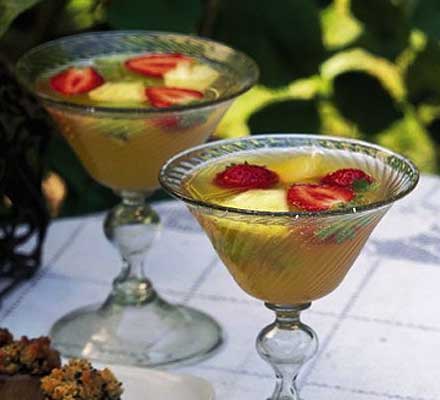Summertime Beverages
 Itís summer, and unless you live in the Pacific Northwest you may be reaching for iced drinks to cool off. What you reach for can really impact your health. Itís summer, and unless you live in the Pacific Northwest you may be reaching for iced drinks to cool off. What you reach for can really impact your health.
Sodas whether regular or diet contain many chemicals that greatly impact your health. Even moderate drinking, as little as one serving a day, has been linked to health problems such as stroke, cardiovascular disease, insulin resistance (diabetes) and inflammation. This is because of ingredients such as phosphoric acid (which leaches calcium from the bones), benzene (a known cancer causer), artificial colors (a suspected cancer causer), and sodium benzoate (linked to DNA damage, cancer).
Wine coolers are more popular in the summer. These have a lot of the problems that sodas have because of the high sugar content as well as all of the problems of alcohol consumption.
Beer has the problems associated with alcohol as well as those associated with wheat. In addition there is the yeast that is used to convert the wheat to alcohol. This causes an increase in uric acid within the body. High levels of uric acid are normally associated with gout, but it has been known for a long time that people with high blood pressure or kidney disease, and those who are overweight, have higher levels of uric acid.
Lemonade, fruit juices and sweetened tea avoid all the alcohol problems, but do contain all the high sugar problems. Most of the drinks at the grocery store labeled fruit juice is really only 20% juice (at most). That means 80% of it is water and high fructose corn syrup. Energy drinks ad to those risks the ones from high levels of caffeine. Sports drinks can contain caffeine and high levels of sodium. All of these have huge health impacts.
That brings us to the iced coffee drinks. Iced coffee is really good for you, unless you add the dairy products and high sugar sweeteners and flavorings. That is where we get into trouble.
Drinking any high sugar beverage has been linked to a 22% increase in the possibility of developing diabetes. These beverages used to be an occasional treat, but have now become the main beverage in the home.
Artificially sweetened beverages carry their own problems. They have been strongly linked to such problems as Parkinsonís disease, Alzheimerís and other forms of dementia.
The best beverage to drink is cool filtered water. You want freshly filtered water, in a glass container, rather than something that is bottled in plastic. The plastic leaches BPA and other chemicals into the water. Many bottled waters contain the contaminates of municipal tap water, because that is what it is. The labels can sound impressive, but look closely at what is says.
Iced black coffee is an acceptable alternative, as long as it doesnít contain sugar or sugar substitutes. A natural sweetener such as stevia is acceptable. Be choosy about your coffees. There are some certified organic ones available. Iced teas, whether green or black, carry the same cautions as coffee. Iced herbal teas with natural sweeteners are also a good choice.
Sources:
http://www.naturalnews.com/040021_soda_pop_obesity_energy_drinks.html
http://www.naturalnews.com/040126_type_2_diabetes_soda_consumption_high_fructose_corn_syrup.html
http://www.reuters.com/article/2013/04/24/health-diabetes-drinks-idUSL6N0DA29G20130424
http://www.naturalnews.com/040151_Welchs_fruit_juice_high_fructose_corn_syrup.html
http://www.naturalnews.com/040647_soda_consumption_stroke_risk_diet.html
http://articles.mercola.com/sites/articles/archive/2013/06/12/summer-beverages.aspx?e_cid=20130612_DNL_art_2&utm_source=dnl&utm_medium=email&utm_content=art2&utm_campaign=20130612
|
|
|
Disclaimer: The entire contents of this website are based upon the opinions of the author(s). Individual articles are based upon the opinions of the respective author. The information on this website is not intended to replace a one-on-one relationship with a qualified health care professional and is not intended as medical advice. It is intended as a sharing of knowledge and information from the research and experience of the authors. You are encouraged to make your own health care decisions based upon your research and in partnership with a qualified health care professional.
|
|
|